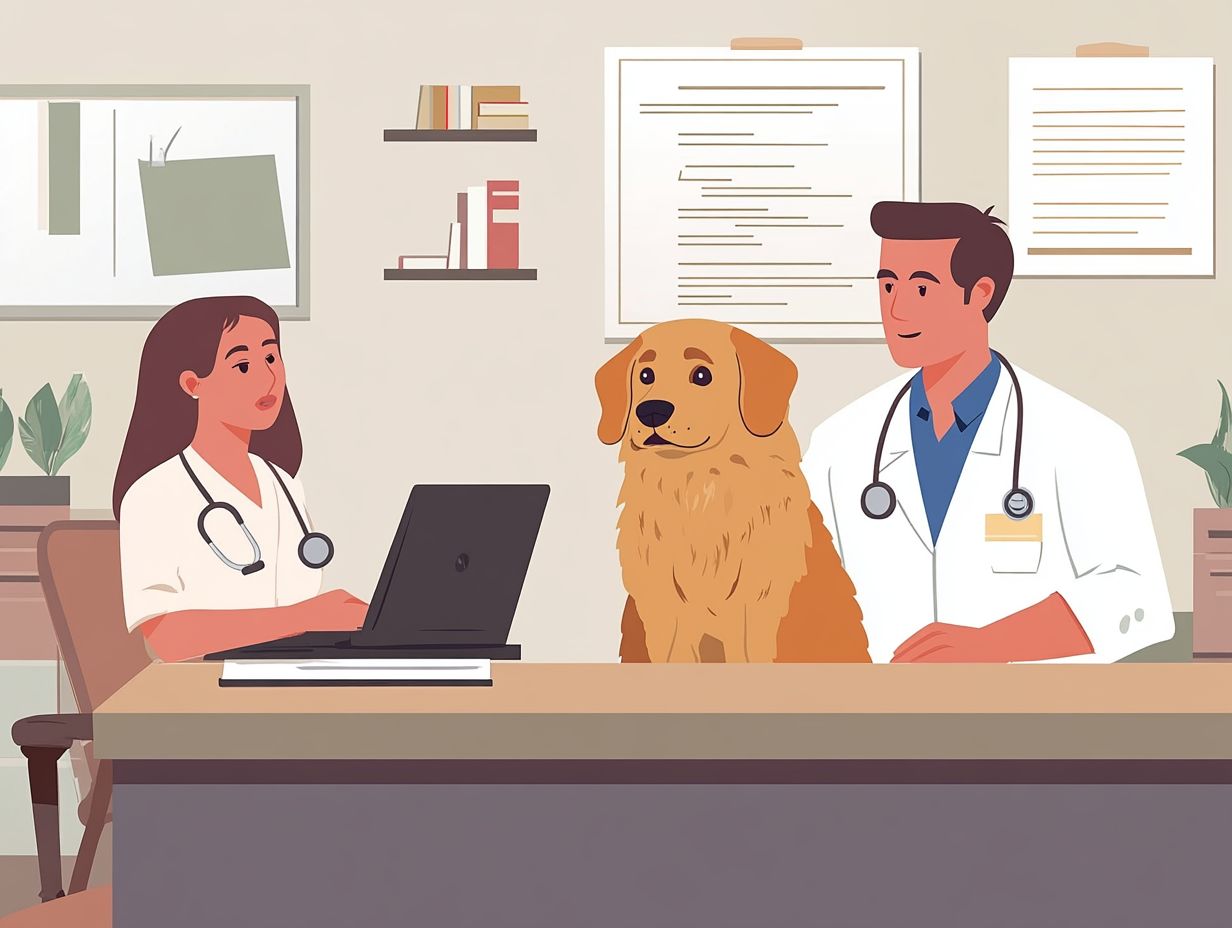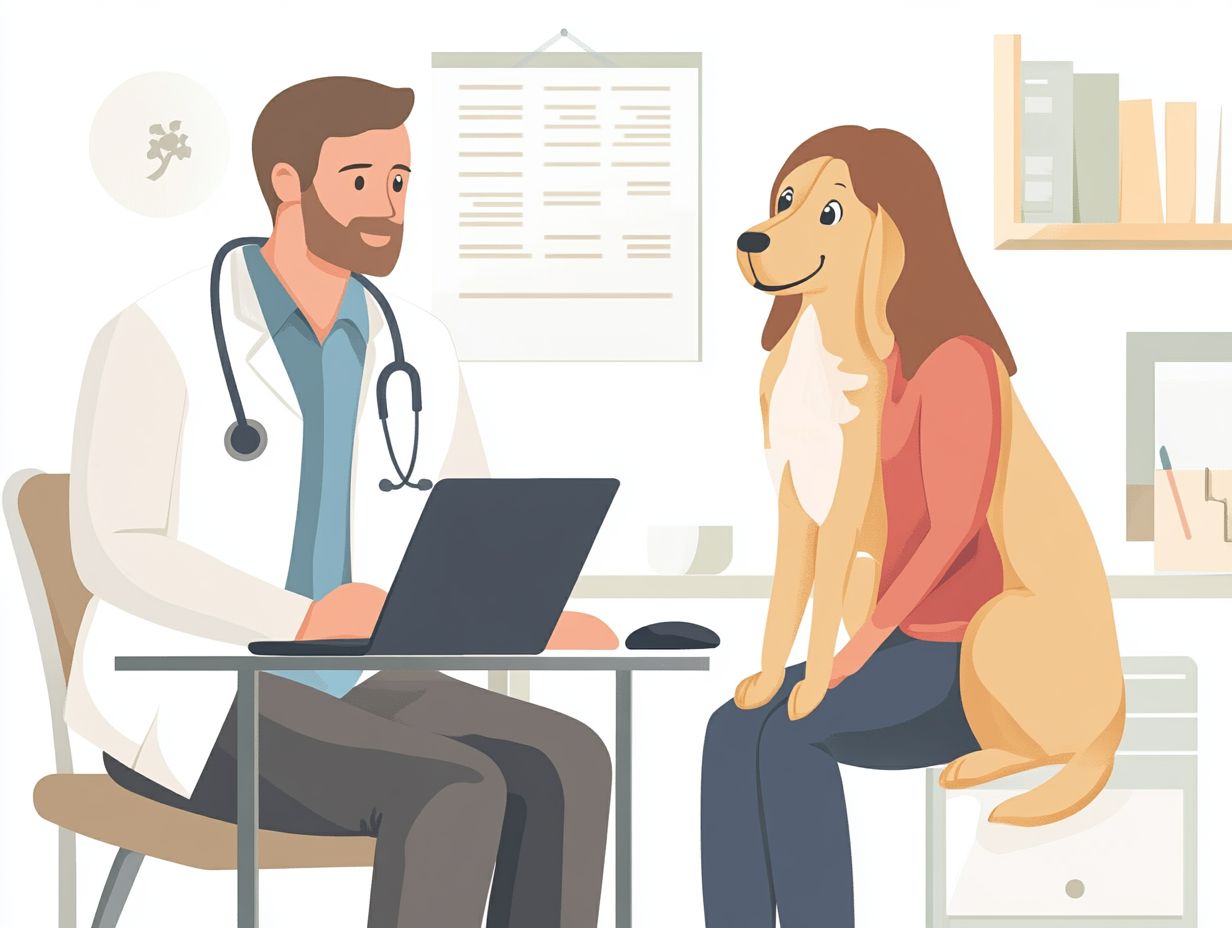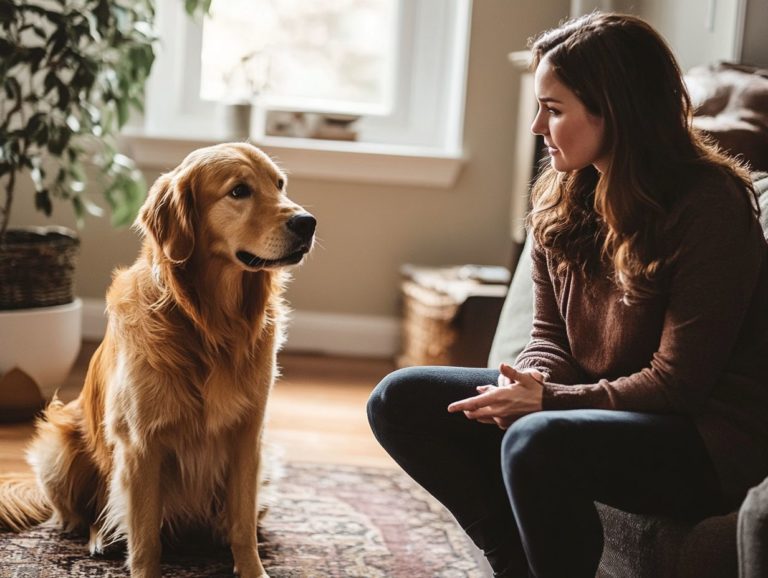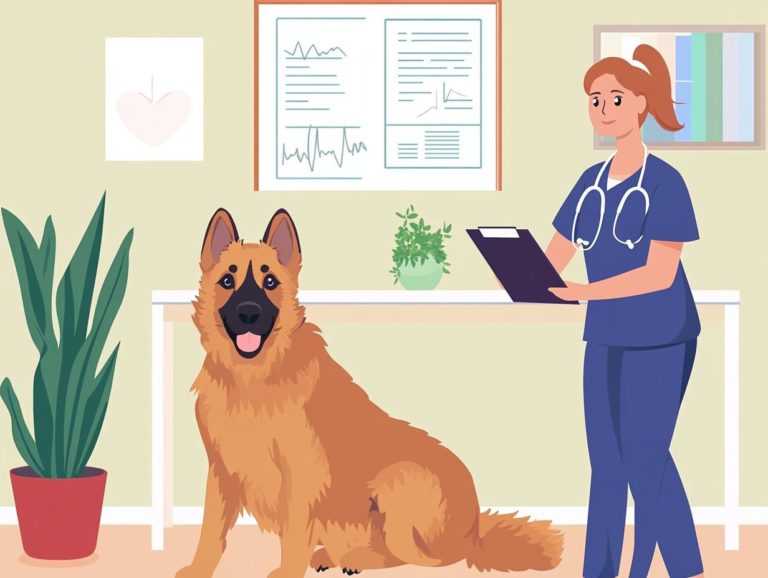Legal Considerations for Pet Anxiety Consultations
Pet anxiety is an increasingly pressing issue for many pet owners. It affects not just the well-being of your beloved companions but also the quality of your relationship with them.
Understanding the causes and symptoms is crucial. However, navigating the legal landscape surrounding pet anxiety consultations adds another layer of complexity.
This article explores the legal requirements, ethical considerations, and best practices in this domain.
Whether you’re a pet professional or an owner seeking assistance, discover valuable insights to foster a safe and effective approach to managing pet anxiety.
Contents
- Key Takeaways:
- Understanding Pet Anxiety
- The Role of Legal Considerations in Pet Anxiety Consultations
- Legal Requirements for Pet Anxiety Consultations
- Managing Liability in Pet Anxiety Consultations
- Best Practices for Pet Anxiety Consultations
- Frequently Asked Questions
- What are the legal considerations for pet anxiety consultations?
- Do pet anxiety consultations require a license?
- What liability do pet anxiety consultants have?
- Can pet anxiety consultants prescribe medication?
- Are there any restrictions on pet anxiety consultations?
- What should be included in a pet anxiety consultation contract?
Key Takeaways:

- Proper qualifications are essential for conducting pet anxiety consultations.
- Communicate effectively with clients and create a safe space for pets.
- Know the laws such as the Air Carrier Access Act to manage liability effectively.
Understanding Pet Anxiety
Pet anxiety is a prevalent concern among pet owners. It can profoundly affect both your animal’s well-being and your overall quality of life.
Understanding the causes and symptoms of pet anxiety is essential for implementing effective interventions and support.
Emotional support dogs and other assistance animals provide comfort and care through their unwavering companionship. Mental health professionals frequently endorse these animals to help ease emotional distress and enhance overall mental health, particularly for those dealing with conditions such as anxiety and depression.
Causes and Symptoms
The causes of pet anxiety can vary significantly, ranging from environmental changes to traumatic experiences. Recognizing the symptoms is essential for effective management.
You might notice excessive barking, destructive behavior, or signs of stress such as pacing or hiding.
Loud noises, like thunderstorms or fireworks, often trigger anxiety in pets. They can instill fear and lead to a frantic response.
Some pets also experience separation anxiety when left alone for extended periods, resulting in distress signals like whining or scratching at doors.
Changes in the household whether it’s a new pet, a new baby, or even a move can disrupt your pet’s sense of security, amplifying their emotional turmoil.
It’s crucial for pet owners to be attuned to these factors and observe their animals for indicators of discomfort. By doing so, you can help create a calmer environment for your furry companions.
Ensure their needs are met through emotional support dogs or psychiatric service dogs.
The Role of Legal Considerations in Pet Anxiety Consultations
Legal considerations are paramount in the consultation process for pet anxiety. This is especially true for those seeking emotional support animals as part of their treatment plan.
Understanding your rights under laws like the Fair Housing Act and the Americans with Disabilities Act is crucial. This knowledge helps navigate the complexities of emotional support animal laws.
These laws are designed to ensure that individuals with disabilities receive the housing accommodations they need. They safeguard you from discrimination while utilizing emotional support animals for therapeutic purposes.
Laws and Regulations Related to Pet Anxiety
Understanding the laws and regulations surrounding emotional support animals is crucial for you if you’re dealing with the challenges of pet anxiety. It ensures that both you and your housing provider meet legal requirements.
The Fair Housing Act and the Americans with Disabilities Act offer vital protections for individuals like you seeking housing accommodations for emotional support animals. These laws highlight the importance of compliance.
These regulations clearly define your rights as someone with a disability, allowing you to request reasonable modifications changes that help you and your pet live comfortably together even in housing situations where pets are typically not allowed. Housing providers are obligated to make exceptions for these animals, ensuring they don t impose unnecessary restrictions or fees that could worsen your challenges with pet anxiety.
Understanding how these laws relate can improve your well-being a lot, enhancing your quality of life and mental health in your living environment. This legal framework fosters inclusive spaces that prioritize the welfare of both humans and animals alike.
Ethical Considerations for Pet Anxiety Consultations

Ethical considerations are essential in pet anxiety consultations, especially when it comes to individuals who depend on emotional support animals for their mental well-being. Your role is crucial as a mental health professional, and you must skillfully navigate this important area while adhering to legal requirements and protecting against disability discrimination.
Prioritizing the best interests of your clients is crucial. This involves recognizing the vital role emotional support animals play in alleviating symptoms of anxiety and depression. You have the chance to make a real difference by conducting thorough assessments, educating clients about their rights, and assisting them in advocating for necessary accommodations in various settings, such as housing and travel.
By striking a balance between empathy and ethical standards, you can effectively support your clients while fostering a broader understanding of the valuable benefits therapeutic emotional support from emotional support animals contribute to mental health treatment.
Legal Requirements for Pet Anxiety Consultations
Legal requirements for pet anxiety consultations are crucial in ensuring that mental health professionals deliver the appropriate support to clients who rely on emotional support animals. You need to get proper documents and evaluate the need for the animal, which checks if having the animal is necessary for mental health.
Qualifications and Certifications
Having the right qualifications and certifications is essential for you as a mental health professional involved in pet anxiety consultations. You play a key role in assessing how emotional support animals can provide therapeutic benefits. It’s important to be well-versed in the legal rights and responsibilities surrounding assistance animals.
Along with holding a relevant degree, you should seek specialized training in animal-assisted therapy. This training will deepen your understanding of how pets can alleviate anxiety and promote emotional well-being. Certifications from reputable organizations, like the Animal-Assisted Therapy Association, offer vital frameworks and guidelines for effective practice.
Understanding the nuances of client-animal relationships is crucial, as it gives you the power to create tailored interventions that genuinely meet individual needs.
Ultimately, blending theoretical knowledge with practical application ensures that you can offer comprehensive support to those facing the challenges of pet anxiety and related emotional distress.
Documentation and Record-Keeping
Proper documentation and record-keeping are vital elements of pet anxiety consultations. This is especially true when addressing requests for assistance animals. As a mental health professional, it’s important to ensure that your documentation is reliable and thoroughly supports your recommendations for emotional support animals.
In these consultations, various types of documentation are essential. This includes detailed assessments that explore the specific anxieties pets experience. Additionally, letters of recommendation outline the therapeutic benefits the animal provides. These letters validate pet owners’ needs and streamline access to housing and travel accommodations for those seeking emotional support.
Organizing your records isn t just a suggestion it s a game changer for effective consultations! Keep detailed notes of each session. It’s crucial to ensure that all documentation is securely stored to maintain client confidentiality. The integrity of these records cannot be overstated, as they substantiate your claims as a veterinarian or therapist. This strengthens the bond between the pet and owner in managing anxiety effectively.
Managing Liability in Pet Anxiety Consultations
Managing liability in pet anxiety consultations is essential for mental health professionals. This is particularly important when dealing with emotional support animals. You must consider ethical factors to minimize potential safety concerns and create a positive experience for both your clients and their furry companions.
Risk Management Strategies

Effective risk management strategies are essential for you as a mental health professional working with clients who have emotional support animals and experience pet anxiety. By implementing these strategies, you can significantly reduce potential liability. Establish clear guidelines for consultations, engage in training on animal behavior, and maintain open lines of communication with your clients.
You should also incorporate thorough documentation practices. Ensure that all interactions regarding the animal’s role in therapy are meticulously recorded. This helps you track progress and provides a solid legal safeguard in case of any disputes.
Actively engaging in safety assessments is another important step. Evaluate the environment to ensure it is safe for both your clients and their emotional support animals.
By prioritizing these risk management practices, you create a more secure therapeutic space. This also fosters an atmosphere of trust and understanding with your clientele.
Best Practices for Pet Anxiety Consultations
Implementing best practices for pet anxiety consultations is essential for you as a mental health professional. This helps you deliver effective support for your clients and their emotional support animals.
By adopting these practices, you can significantly enhance the consultation experience and foster meaningful communication. Create a safe, comfortable environment for both the pets and their owners.
Effective Communication with Clients
Effective communication with clients is paramount during pet anxiety consultations. It s key to building trust and fostering a deeper understanding of the vital role emotional support animals play in treatment. Clear communication helps you navigate legal intricacies and address any concerns your clients might have.
Use techniques like active listening and empathy to enhance rapport with your clients. This allows essential issues and emotions to surface naturally during discussions. When you consider your clients perspectives and feelings, it becomes easier to tailor treatment plans that resonate with their specific needs.
Make sure your clients feel heard; this opens the door to honest conversations. This paves the way for a more productive consultation process. Ultimately, the way you engage in dialogue impacts client satisfaction and shapes the overall effectiveness of the support you provide. Communication plays a profound role in this essential field.
Creating a Safe and Comfortable Environment for Pets
Creating a safe space is essential for your pet’s happiness and health! A safe and comfortable environment for your pets is a fundamental aspect of pet anxiety consultations, greatly affecting their behavior and emotional well-being.
Emotional support animals flourish in spaces that minimize stress and facilitate therapeutic interactions. To enhance this setting, consider reducing loud noises and visual distractions, as these can be overwhelming for sensitive animals.
Incorporating familiar items, like a favorite blanket or toy, can instill a sense of security, helping your pet feel more at home. Soft lighting and calming scents, such as lavender, further enrich a peaceful atmosphere.
Engaging in gentle, reassuring communication can build trust. This allows your pets to relax and open up during consultations. These strategies promote a stable environment and play a critical role in evaluating pet behavior.
Frequently Asked Questions
What are the legal considerations for pet anxiety consultations?

The main legal consideration for pet anxiety consultations is ensuring that the pet owner provides informed consent for any treatments or recommendations given by the consultant. This includes explaining the potential risks and benefits of the treatment, as well as the role of veterinary advice in managing pet anxiety, including any potential side effects or alternatives.
Do pet anxiety consultations require a license?
In most cases, pet anxiety consultations do not require a specific license. However, it is important for the consultant to have a thorough understanding of the laws and regulations surrounding animal welfare and behavior to ensure they are providing appropriate care and advice.
What liability do pet anxiety consultants have?
Pet anxiety consultants may be held liable for any harm caused to the pet or owner. It is important for consultants to have liability insurance to protect themselves in case of any legal action.
Can pet anxiety consultants prescribe medication?
No, pet anxiety consultants are not legally able to prescribe medication for pets. This can only be done by a licensed veterinarian. Consultants may provide recommendations for natural remedies or refer the pet to a veterinarian for medication.
Are there any restrictions on pet anxiety consultations?
Some states or countries may have specific regulations or restrictions on pet anxiety consultations, such as requiring a veterinary referral or limiting the types of treatments that can be offered. It is important for consultants to familiarize themselves with these laws and adhere to them.
What should be included in a pet anxiety consultation contract?
A pet anxiety consultation contract should outline the services being provided, the fees and payment terms, and any limitations of liability. It should also include a section for the pet owner to provide informed consent and acknowledge any potential risks.
If you have more questions, don t hesitate to reach out!






